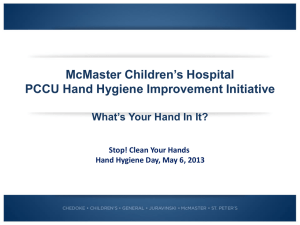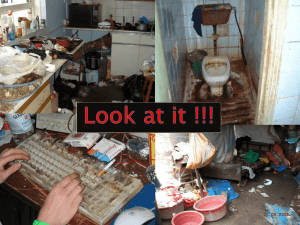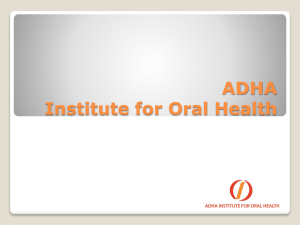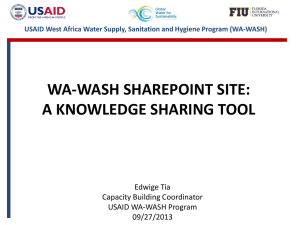A Study On Hygiene At UMP Cafeteria
advertisement
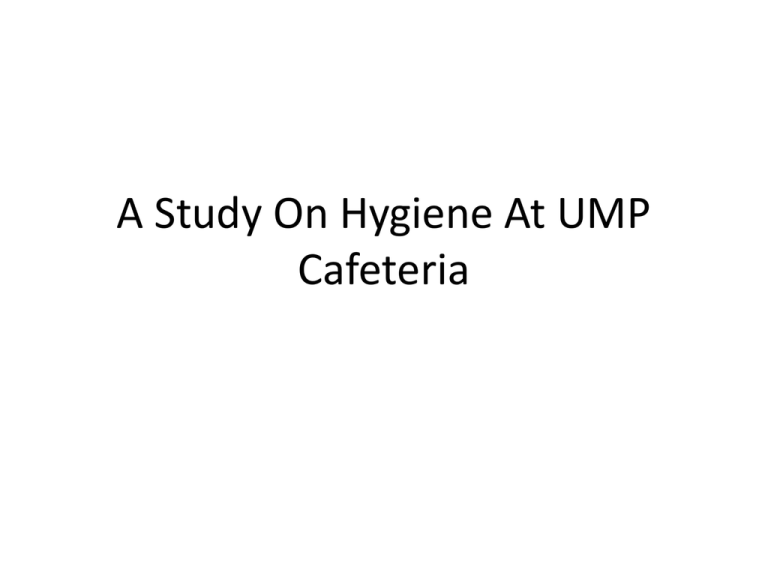
A Study On Hygiene At UMP Cafeteria Introduction • The hygiene at the KK1 Cafeteria in UMP is become our research topic. • Hygiene level is a system of principles for the preservation of health and prevention of disease. • This includes environment hygiene, food hygiene and worker hygiene and so on. Research Objective The research objectives of our study are to identify the level of hygiene which included: 1. To identify the causes regarding the level of hygiene at KK1 Cafeteria. 2. To identify effects regarding the level of hygiene at KK1 Cafeteria. 3. To identify the ways to solve the problems regarding the level of hygiene in KK1 Cafeteria. Research Question • What are the causes regarding the level of hygiene in KK1 Cafeteria? • What are the effects influenced by the level of hygiene in KK1 Cafeteria? • How to solve the problem regarding the level of hygiene? Scope of Study Data Analysis Dan Finding Demographic Background of Research Background of Research (cont…) Background of Research (cont…) 1. The Causes Regarding to The Level of Hygiene in KK1 cafeteria Causes regarding to the hygiene at cafeteria included: • Cause Regarding To Food Handlers Hygiene • Cause Regarding To Equipment And Environment Hygiene • Cause Regarding To Food Hygiene The Causes Regarding To The Level Of Hygiene In KK1 Cafeteria. Rate Of The Personal Hygiene Procedure Fulfillment 2. The effects influenced by the level of hygiene Introduction o Effect base on: a) Human Health b) Environment Figure 2: The Environment of the KK1 Cafeteria Number of the UMP student have been ill due to eating at KK1 Cafeteria 20 18 18 16 no.of respondents 14 13 13 0 12 1 10 9 8 2 3 4 7 more than 5 6 4 2 0 0 Times Number of the UMP Student have been warded in the hospital due to hygiene level and food in KK1 cafeteria 0% 15% NO 85% YES The type of disease has been suffer by UMP Student due to hygiene level and food in KK1 cafeteria 6 5 5 4 3 3 Type of Dieseas 2 1 1 0 0 Abdominal pain Food poisoning Diarrhea Other 3. The Ways to Solve Regarding the Level of Hygiene Conclusion • The majority of the respondents consider most of the 2BCN UMP students consider raw or half-cooked meat or raw unwashed vegetables and unhygienic practice of food handlers are the causes regarding to the food hygienic. This is because the bacteria grown on the unhygienic handling food. However, majority of the respondents consider most of the staffs wash hands using an anti-bacterial soap and single-use paper towels to fullfill the personal hygiene procedure. This show that hand hygienic is related to the food hygienic handling. • The majority of the respondents do know the various bad effects caused by low level of hygiene on personal health. Last but not least, the main effect influenced by the level of hygiene in the KK1 cafeteria is the environment as well. • Most of the 2BCN students prefer the way cover the food as the way to solve the problem regarding the level of hygiene in KK1 cafeteria. The reason is they feel cover the food can avoid flies or viruses around the air attach on the food surfaces. Recommendation In order to reduce the number of the UMP students have been ill due to the low level of hygiene in KK1 cafeteria, it is essential that cover the foods to avoid flies and viruses in the air attach on the surface of the foods. Furthermore, the role of staff also very important to improve the hygiene level of cafeteria. As comment by Cakiroglu and Ucar (2008), cafeteria employees must have a clean, tidy and proper look, do not have any skin infections, have good teeth hygiene, have short finger nails and are not in the habit of biting nails, do not wear jewellery except for their wedding ring, do not make up, work in clean shoes and uniform, and believe hygiene is a must among the staff employed in food and beverages services. In order to reduce the flies in KK1 cafeteria, it is necessary to clean and sanitize the tables and equipment surfaces. Ferreira et al. (2009) comments that floor, work surfaces and also walls should be clean and sanitize for 30 minutes using a mild detergent.
